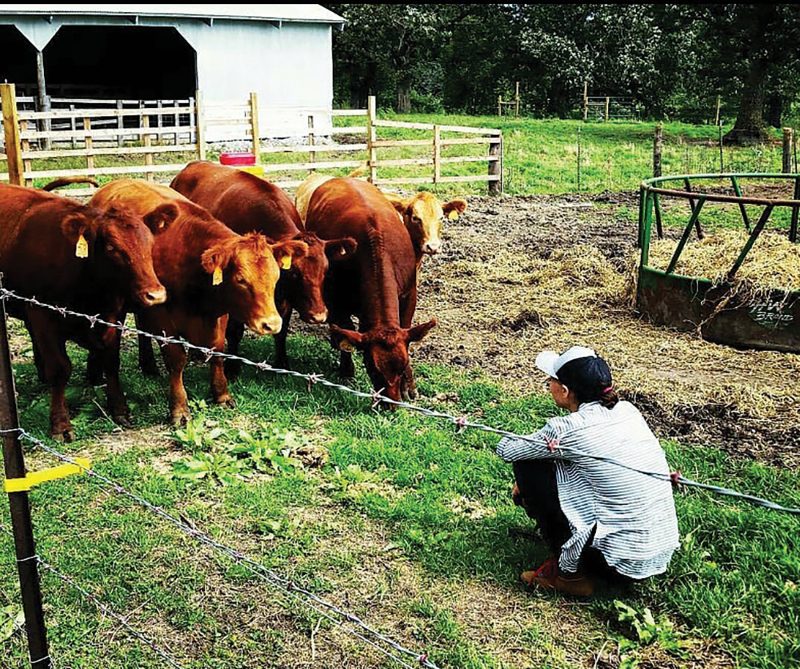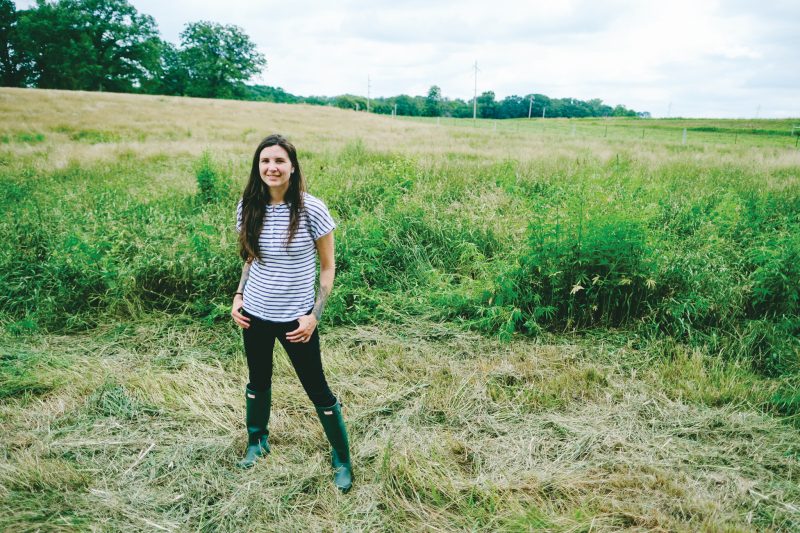2025-2026 Farm Beginnings Class
LSP is now accepting applications for its 2025-2026 Farm Beginnings class session. For details, click here.
♦ ♦ ♦
This is a story about how traffic jams aren’t all bad, the powerful draw of regenerative agriculture, an MBA project, and how one woman living in the suburbs got over imposter’s syndrome, in the process flipping her view of what a future on the land can look like.
“It’s kind of wild — when I started Farm Beginnings, I was pretty sure I needed to eliminate cattle from the farm when I take over,” Valerie Hsu says.
These days, bovines play a key role in the 37-year-old’s plans for continuing an economically and environmentally sustainable legacy on 100-plus acres of rolling farmland northwest of New Ulm, in south-central Minnesota. Hsu sees raising cattle on grass using managed rotational grazing as a way to continue building the soil and to protect natural habitat on this scenic land, all while providing food for people in a way that contributes to a vibrant community.

“Bringing cattle back onto the land has really brought life back onto the farm, and has really connected our family in a different way,” she says.
Hsu is making this statement over a year after giving a presentation to her fellow Farm Beginnings classmates about her plans for taking over the farm, which has been in the family since 1920. During that presentation, she was clearly hesitant to carry on the grass-finished cattle business her uncle, Keith Boettger, has been running. She wasn’t sure if she could handle the large bovines, and was interested in other aspects of farming, like raising u-pick berries, flowers, or even vegetables. But when she looked at the land, her family, and the community, the cattle kept calling to her.
Traffic Jams & MBA
Boettger had mostly raised row crops on the farm over the years but had fond memories of being around cattle in his younger days when the operation was a dairy. Around a decade ago, while running a livestock hauling business, he often found himself stuck in traffic. Through the hauling enterprise, he was seeing firsthand how the bulk of livestock were not being raised out on pasture, and he didn’t like it. To make use of his traffic jam downtime, Boettger began Googling information on raising beef cattle utilizing methods like managed rotational grazing of perennial pastures.
That eventually led to the return of cattle to the farm, and eight years ago he launched a grass-finished beef business with his sister — Valerie’s mother — Kay Steffl. Today, Boettger and Steffl have a 50-cow herd consisting of Angus, Shorthorn, Hereford, and Gelbvieh breeds.
Hsu grew up in New Ulm and has lots of good memories of visiting the farm when she was young, but for a time didn’t see a future there. After high school, she went to college and moved away.
“I never saw any way that I could be involved with the farm, because no one was telling me, ‘Hey, you should be getting on the tractor,’ ” she recalls. “Probably because I’m a girl too, right?”
However, while getting a master in business administration, Hsu took on development of a marketing and branding plan for the family’s beef herd as her capstone project. Through that work, she realized there was a growing demand for a regeneratively-raised product like grass-fed beef. Stormy Creek Beef Farm now markets directly to eaters, as well as to a food co-op in New Ulm and a local restaurant; they can’t keep up with the demand.
“So every year it seems like our New Ulm customer base is growing, and that’s so exciting for us,” she says. “People are seeking out local food.”
In addition, Hsu, who stopped eating beef for a time because of concerns around how conventional cattle were treated and the impact they were having on the environment, was struck by how the rotational grazing of the animals was building the land’s soil health and creating natural habitat for birds and pollinators.
An idea took root: could a farm that wasn’t focused on just raising corn and soybeans actually contribute to improving the environment, all while allowing an opportunity for her to continue her family’s legacy? Just as importantly, could it have a positive impact on the fabric of the New Ulm community by providing healthy, local food and being a cog in the economy?
“I want this to be a place of rural opportunity,” says Hsu. “I was a rural kid, and with corn and soybeans surrounding us, there wasn’t much opportunity to utilize the land for the enjoyment of our own communities or eat foods grown locally.”
A couple years ago, she started talking to her mom about the idea of returning to the farm. Steffl then mentioned it to her brother. To put it bluntly, he was shocked.
Hsu knew that in order to be taken seriously, and to get over what she calls a feeling of “imposter’s syndrome,” she needed to go beyond just talking about how wonderful it would be to move from the suburbs to a scenic farm in rural Minnesota. So, in 2023 she enrolled in the Land Stewardship Project’s Farm Beginnings class. Hsu was attracted to the course because of its emphasis on how holistic business management can help a farm strike a balance economically, environmentally, and from a quality of life point of view. She says it was also key to be in the same space with other people who were interested in developing businesses that are not part of the conventional system.
“I think seeing other people who really want to be a farmer and also are at different stages in the process, I felt like less of an imposter,” says Hsu.
The Farm Beginnings experience also introduced Hsu to a network of established farmers who are making a go of it with various enterprises, from vegetables and u-pick berries to flowers. Since taking the class, she has even spent time working on 10th Street Farm, a vegetable operation in the Twin Cities area run by Ashley Thorfinnson and Chris Barth, who are Farm Beginnings grads.
“Without taking the Farm Beginnings course, I don’t know if I would have had the confidence to reach out to all these farmers,” she says. “Being able to say, ‘I went through the Farm Beginnings Program,’ they were like, ‘Oh, yeah, absolutely, come on over.’ ”
But perhaps most importantly, Hsu feels the course gave her the language she needed to talk about transitioning the farm to the next generation. Continuing her family’s legacy of producing food in a regenerative manner is important to her, but so is making sure her parents and uncle have an opportunity to stay on the farm via intergenerational housing as long as they are able. Through the holistic planning and goal-setting processes, as well as via sessions on using these tools to communicate with family members and partners, Hsu feels better prepared to have the discussions that need to be had as she steps into the operation.
“I see my interest is not only to keep the farm in the family, but making it a place where my family can continue,” she says. “My family is very southern Minnesota — it’s hard to talk about things. Farm Beginnings gave me more confidence to really have the conversations that we need to start having now.”
And one of those hard conversations was an internal one Hsu was having about the role cattle will play in the farm’s future. By the time she wrapped up her time in the Farm Beginnings course, she decided that the grass-based livestock enterprise plays too important a role in the farm and community to let go. One thing that helped her get over her hesitancy over working with livestock was a grazing school LSP held in southeastern Minnesota during the summer of 2024. Through that course, she was exposed to ideas related to pasture improvement and innovative fencing and watering techniques, as well as financial management and soil health monitoring.

“I find the link between grazing, soil health, and ecosystem health — birds and insects — completely and absolutely fascinating,” she says.
Decision Time
Hsu currently works as a communications specialist for Ramsey County, and she lives with her husband, Tristin, and their two young children in the Twin Cities suburb of Woodbury. She feels the clock is ticking and in the next few years some major decisions will need to be made when it comes to the farm, like when will her family move onto the land and how housing for all the extended family members will be handled. Tristin is from Kuala Lumpur, the capital of Malaysia and home to over two million people. Moving to a farm would be a big adjustment, but Hsu jokes that conversations around such a step have gone from a “no way” response to an acceptance that this is in the family’s future. “It’s definitely not a ‘hell no’ at this point,” she says with a laugh.
By early 2025, Hsu was applying for a USDA Environmental Quality Incentives Program grant to increase grazing infrastructure on the farm, making plans to improve some worn-out pastures and perhaps manage the woodlands utilizing silvopastuturing, and working on establishing pollinator plantings.
But another thing Hsu learned through the Farm Beginnings course is that in order to be happy on the land, she needs to consider what enterprises she’s interested in, and not just what family, the community, and the markets expect. So, she’s also identified a couple acres where she wants to plant apple trees and u-pick berries. When she and her uncle took soil samples from that parcel they found evidence that whatever is planted there will do well.
“The topsoil was so soft, deep, and black, and really showed the benefits of his conservation practices for the last 10 years,” reports Hsu. “I’m looking forward to getting the test back.” ♦
This profile originally appeared in the No. 1, 2025, Land Stewardship Letter. To read other Farm Beginnings profiles, click here. You can hear the stories of Farm Beginnings grads on our Fresh Voices podcast series.